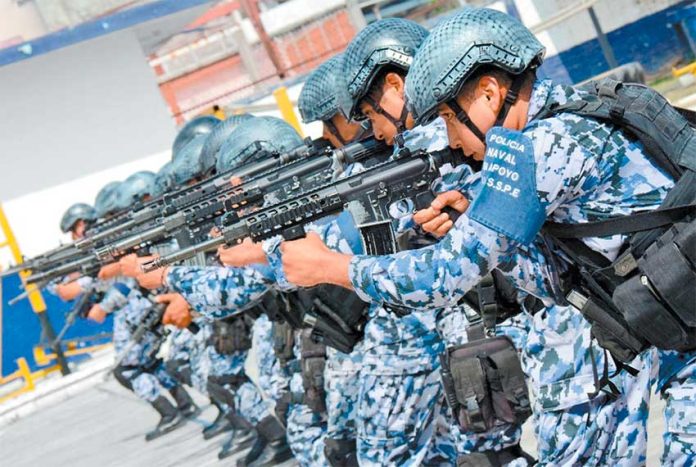Members of a special naval police force based in the most dangerous municipalities of Veracruz for the past eight years are President López Obrador’s choice to be the first recruits for the national guard.
Made up of 1,230 men and 70 women, all of whom were formerly marines, the elite force was created in 2011 after then Veracruz governor Javier Duarte asked former president Felipe Calderón for the navy to support security operations in the state.
An admiral of the force told the newspaper Milenio that the members were selected based on the standard of their conduct in the navy, after which they received training from state police, the Federal Police and the federal Attorney General’s office, and human rights education from the National Human Rights Commission (CNDH).
The military police were initially deployed to just two municipalities, Veracruz and Boca del Río, but in 2013 they also began patrolling Xalapa, Tuxpan and Coatzacoalcos.
During the past eight years, the state government has continued to renew agreements with its federal counterpart to ensure that the force remains in Veracruz.
At all times, the naval police are accompanied by state or municipal police while they work so that, according to the force’s commanders, they can draw on each other’s experience and knowledge.
However, police in Veracruz were widely considered corrupt during Javier Duarte’s term.
Four former high-ranking security officials and 15 police officers allegedly used death squad tactics to abduct, kill and dispose of the bodies of at least 15 people during 2013. Xalapa, the state capital, was one of the locations where the crimes were committed.
Duarte, considered one of Mexico’s most corrupt governors ever, was sentenced to nine years in prison last year for money laundering and criminal association.
Giselle Rodríguez, a human rights educator who works with the naval police, said that it is “very important” for the force’s members to be “fully trained” on human rights issues and conceded that doing so is a “challenge.”
However, she also said that the members of the force that has been operating in Veracruz have demonstrated keen interest in the area by constantly asking her questions about the human rights training they receive, particularly that which focuses on contact with citizens.
According to the Secretariat of the Navy (Semar), the naval police currently deployed in Veracruz could be assigned to national guard roles in other parts of the country but stressed that they, and all other new recruits to the security force, will first need to undergo additional training.
The Senate unanimously approved the creation of the national guard last week but the lower house of Congress and a majority of state legislatures must also give their approval before recruitment can begin.
The National Human Rights Commission and a range of non-governmental organizations have criticized the government’s decision to create the new force, arguing that its deployment will perpetuate the failed militarized crime-fighting strategy implemented over the past 12 years and result in the military committing more human rights abuses.
But President López Obrador last week rejected the criticism, declaring that “human rights will be respected” and that “the national guard is going to be like the United Nations peacekeeping forces.”
Source: Milenio (sp)
